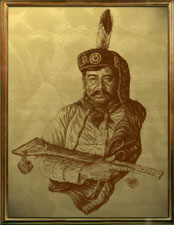|
|
|
|
Peoria

TRIBE NAME: French corruption of the word Peouarea, meaning "he comes carrying a pack on his back."
LANGUAGE: Formerly one of the five tribes of the Illinois Confederacy, belonging to the Algonquian linguistic family.
HISTORY: The Peoria tribe first lived near the mouth of the Wisconsin River in the area of Prairie du Chien, then moved southward to the site of present Peoria, Illinois. After the French and Indian War, their enemies (including the Kickapoo and Fox tribes) began a war of extermination against all Illinois tribes. Some joined with the Wea and settled on the Blackwater Fork near St. Genevieve, Missouri, but most stayed and faced near destruction. In 1818, they united with the Kaskaskia.
In 1832, the Peoria and other Illinois Confederacy members gave up their land in Illinois and Missouri and were assigned a reservation in Miami County, Kansas. There they prospered as an industrious people under the influence of a Roman Catholic mission. The influx of white settlers led them to join with neighboring peoples. In 1849, they and remnants of seven other Illinois tribes merged to become the Confederated Peoria. With the 1861 organization of the state of Kansas, the tribes were harassed by inequities and illegal property taxation.
At the end of the Civil War they signed a treaty that sold their land in Kansas and called for their removal to Indian Territory. With the proceeds they purchased their new I.T. reservation (in Ottawa County) from the Quapaw and Shawnee. In 1873, the Confederated Peoria united with the Miami tribe and became known as the United Peoria and Miami. In 1893, they received individual allotments of tribal land and in 1907, became citizens of the new state of Oklahoma.
LANDMARKS: The State Museum of History (Oklahoma City); the Gilcrease and Philbrook Museums (Tulsa).
Current tribal roll: 2,631
PEORIA
Joe Goforth, Acting Chief
Peoria Tribe of Oklahoma - http://www.peoriatribe.com/
Official homepage of the Peoria Tribe of Indians of Oklahoma. |
|
|
|
|
|
 Native American Nations
Native American Nations
